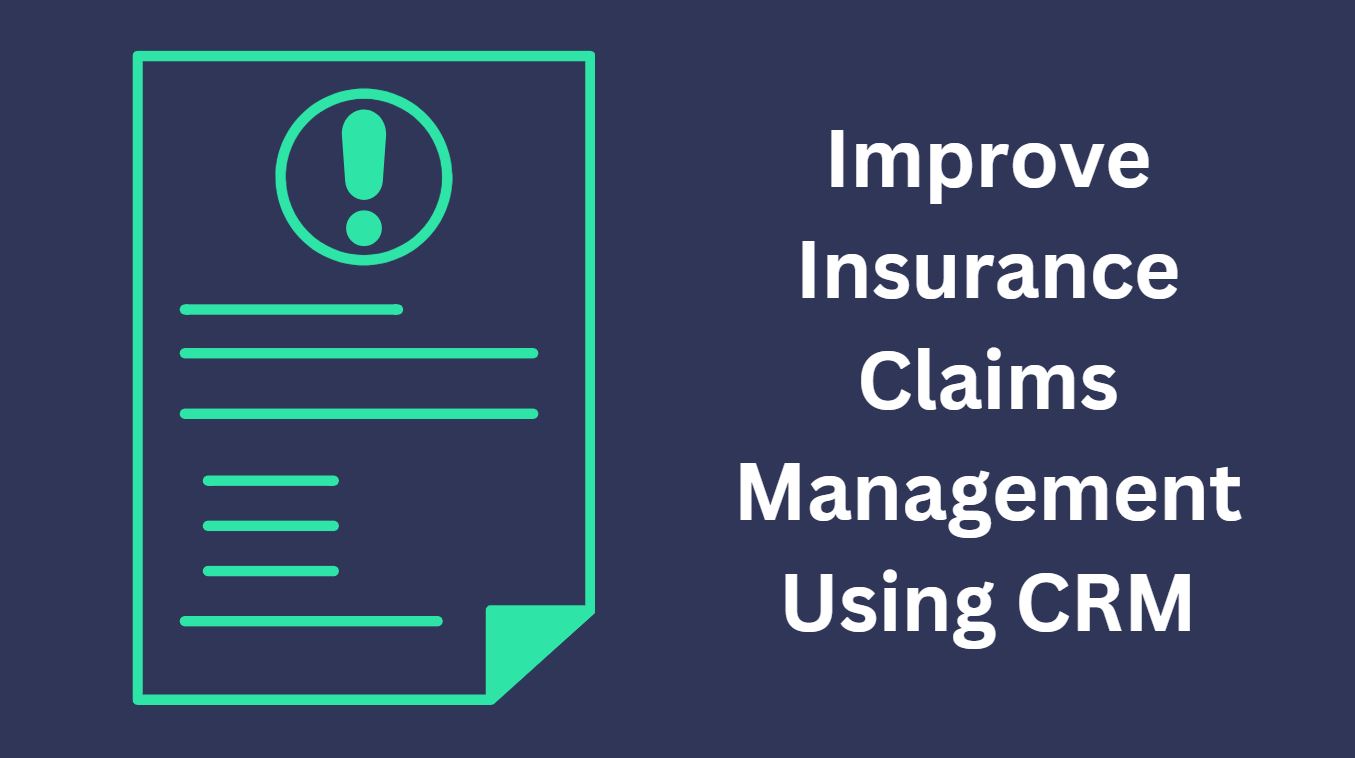- Likes
- Followers
- Followers
- Followers
- Subscribers
- Followers
- Members
- Followers
- Members
- Subscribers
- Subscribers
- Posts
- Comments
- Members
- Subscribe
Improve Insurance Claims Management Using CRM

An insurance claim is always preceded by some tragic event. It can be something as serious as death of a dear relative or permanent disability. Reimbursement of medical expenses after hospitalization, theft of personal property, damage to own or other vehicles due to road traffic accident. Or something similar.
What Does Insurance Claim Means?
It simply means that nobody files with an insurance company after some happy occurrence. That every person who comes with claims is trying best to cope with some personal tragedy regardless of its magnitude.
Obviously, such claimants wouldn’t be in the right frame of mind while filing a claim. They’ll suffer from common human emotions including anxiety, uncertainty, fear, worry, stress and lots more.
Given this scenario, even the best customer relations executive or manager would fail to execute duties astutely. Often a customer leaves an insurer’s office more worried than while entering.
They’re often at loss to know whether their claim will be successful or not. And there’s that lingering stress of insurance companies asking for multiple and sometimes long list of documents that require Herculean efforts from a family or individual coping with tragedy.
Blaming Customer Relations Staff
Despite best efforts by customer relations executives manning claims counters, most claimants leave an insurance office with some degree of disgruntlement. This calls for some introspection. Are customer relations staff to blame for this scenario?
The answer is yes and no.
Yes, because a customer relations executive receives several claims daily. They’re expected to be impartial while adhering to company policies on claims. Hence, they’re at the receiving end of the ire of any claimant.
No, because customer relations executives in India lack adequate emotional intelligence skills. They are unqualified when it comes to dealing with a claimant who’s recently had a traumatizing experience. Hence, their dealings would seem apathetic while it may not be the case.
The Impact & Damage On Insurance Company Without CRM
A disgruntled claimant is a potential threat to an otherwise healthy reputation of any insurance company. And this threat can arise from unexpected quarters.
-
- A claimant can drag an insurance company to court.
-
- They can spread negative publicity in form of a human interest story in the local media. And insurance companies can expect little sympathy from readers or journalists.
-
- A disgruntled claimant can approach Insurance Regulatory & Development Authority of India (IRDAI) seeking redress. This means, an insurance company will have to spend man-hours and resources on responding to queries by IRDAI.
Posts You May Like
-
- The Indian government provides an Insurance Ombudsman. An informed claimant won’t flinch to approach this official who’s expected to be impartial.
-
- Or a claimant that believes an insurance company is treating them unfairly can file a complaint directly with National Consumer Helpline and portal causing severe embarrassment and negative publicity for the company.
- And they can file an online complaint at Public Grievances Portal of the Indian government.
None of these scenarios are desirable for any respectable insurance company. Hence, we should be very careful while investing in insurance plans & the question arises, how to prevent such problems while serving claimants get insurance payouts quickly and with least possible hassles?
Roles of CRM In Improving Insurance Claims Management
That’s exactly where Customer Relations Management Systems or CRMs come into play. CRMs are claim management software or Artificial Intelligence (AI) based solutions that enable claimants serve multiple purposes in claims management process flow.
A CRM can be utilized as standalone unit, through telephones and website; Or insurance companies can empower their customer relations executives by providing efficient CRMs.
Here are some areas where CRMs are useful.
-
- A good Claim Management System informs claimants about documents and other formalities for compliance and processing.
-
- It enables claimants to upload documents online that enable speedier claims management process flow.
-
- CRMs vastly reduce or eliminate opportunities for human delays and errors.
-
- A claimant can track status of their claim from any location in the world using an online CRM of the insurance company.
-
- Furthermore CRM reduces interaction between front office executives and claimants leaving little chances for complaints of poor customer service.
-
- Also, providing CRMs to customer relations executives enables them to prioritize claims and expedite processes.
-
- CRMs are useful in prevention of insurance related frauds either from external sources or within a company.
- Claimants in remote parts of the country needn’t travel long distances to file claims: they can do so online using a CRM.
Nowadays, a lot of Non-Banking Financial Companies in India are using CRMs that incorporate Artificial Intelligence. Consequently, they’re able to provide superior services to clients while expanding customer base.
In Conclusion
Nobody can deny the importance of that human touch in customer relations management. A Claim Management System (Insurance Claims Management) therefore shouldn’t be viewed as replacement or rival to human intelligence and effort. At the same time, CRMs help insurance companies to streamline their claims management process flow while making it faster and increasing efficiency. They provide customer with that superior experience that helps prevent negative impact & improve productivity on the company. Hence, general insurance companies and life insurance companies can improve their claim management in insurance systems using a good CRM for their claims management processes flow.
Image credit- Canva


Comments are closed.